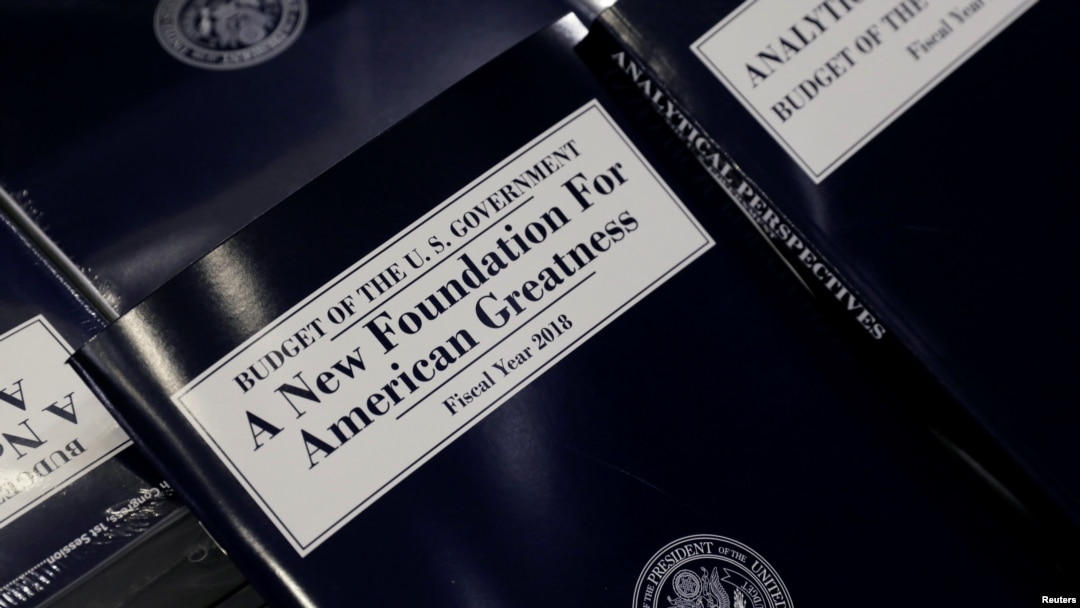U.S. President Donald Trump's administration has unveiled a $37.6 billion budget request for the State Department and U.S. Agency for International Development (USAID) for fiscal 2018, cutting nearly one-third in funding for foreign aid, humanitarian food assistance and peacekeeping missions around the globe.
The estimated spending for fiscal 2017 is $54.89 billion.
This new budget proposal prioritizes programs that support efforts aimed at defeating the Islamic State militant group and other terrorist organizations, enhancing the State Department's cybersecurity posture, and combating illegal migration and trafficking.
It also includes cuts to the public diplomacy program, as well as funding for nongovernmental organizations, while streamlining administrative and travel-related costs of the State Department and USAID.
Secretary of State Rex Tillerson said the new budget proposal reflects a "more efficient and more effective" U.S. diplomacy engagement and aid programs that advance American's national security, economic interests and values.

Budget Director Mick Mulvaney speak to the media about President Donald Trump's proposed fiscal 2018 federal budget in the Press Briefing Room of the White House in Washington, May 23, 2017.
But diplomatic sources and budget experts told VOA they fear the sizable cut will demoralize America's diplomatic corps and undermine the voice of the U.S. overseas.
The FY 2018 budget eliminates programs including the Asia Foundation and the East West Center. It also proposes the elimination of funding for climate change programs.
Programs sponsored by the State Department's Bureau of Educational and Cultural Affairs (ECA) are slashed, in favor of what some regard as more successful ones, including the Fulbright and International Visitor Leadership programs.
It also consolidates assistance programs, including food aid and emergency refugee and migration needs, as well as economic and development assistance.
Security interests
State Department officials described the steep reductions as necessary to bond development aid with U.S. national security interests.
"Our assistance must become more effective," said the State Department's Office of U.S. Foreign Assistance Resources director, Hari Sastry. "Our primary mission is to advocate for the national interests of our country. It also recognizes some of these global challenges cannot be met by U.S. alone, but require global efforts.
"We will be asking others to step up and do more," he added in a telephone briefing Tuesday.
The budget proposal came as the State Department wrapped up a listening tour of agency reorganization, according to Doug Pitkin, director of the Bureau of Budget and Planning.
The procedure for reforms of future program operations at the State Department will continue through this summer. Under the so-called "skinny budget," 2,300 American diplomats and civil servants at the State Department may be let go.
But "this budget does not assume any particular outcome," Pitkin said.
Concerns over U.S. influence
Former diplomats expressed fear that cutting foreign aid risks giving up U.S. influence in other regions and countries.
Laura Kennedy, former deputy assistant secretary for European and Eurasian affairs, told VOA on Tuesday that the new budget request does not "provide an uplifting message" for America's diplomatic corps, by putting a predominant focus on security but little attention on addressing "underlying causes of terrorism."
"Cuts of approximately 30 percent will be Draconian," said Kennedy, adding that "State folks will be looking to Congress to rectify this."
Earlier in February, more than 100 retired generals and admirals sent an open letter to the White House and the Congress, cautioning against cuts to foreign aid and diplomatic engagement.
The letter said many of the crises the U.S. faces "do not have a military solution alone." It cited the State Department and USAID's role in maintaining global stability by confronting extremist groups like Islamic State, curbing refugee flows and combating infectious diseases like Ebola.


